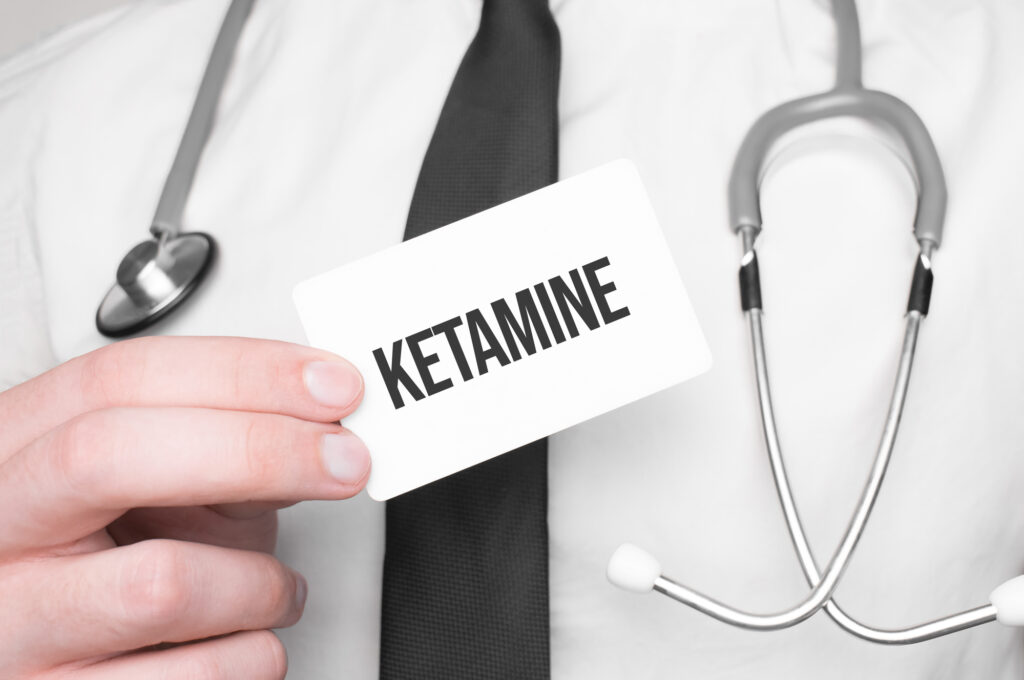Researchers at Yale, writing in the American Journal of Psychiatry, describe a case of ketamine withdrawal that illuminates many of the issues with the drug.
“This case provides a rare clinical description of a possible severe acute ketamine withdrawal,” they write.
“This case illustrates the gravity and urgency of the need to collect data on the ongoing off-label use of racemic ketamine and how these prescribing trends may be affected by the approval and implementation of esketamine. Given the potentially serious adverse effects of ketamine and esketamine, doing so is essential in order to provide effective, safe, and evidence-based treatments for our patients with treatment-refractory depression.”
 The subject of their report was a 35-year-old veteran (“Mr. A”) who received ketamine as a treatment for mental health problems. Like many real-life patients, he had a variety of diagnoses, including “posttraumatic stress disorder (PTSD), bipolar II disorder, alcohol use disorder in full sustained remission, cannabis use disorder, and borderline personality disorder.”
The subject of their report was a 35-year-old veteran (“Mr. A”) who received ketamine as a treatment for mental health problems. Like many real-life patients, he had a variety of diagnoses, including “posttraumatic stress disorder (PTSD), bipolar II disorder, alcohol use disorder in full sustained remission, cannabis use disorder, and borderline personality disorder.”
No medical treatment had worked for him, including numerous antidepressant drugs and other types of medications, electroconvulsive therapy (ECT), and transcranial magnetic stimulation (TMS). After all of these drugs and interventions failed to relieve his problems, he volunteered for a clinical trial of ketamine infusions. He reportedly found this to be the most helpful—although not that helpful since this paper was written after he presented to the emergency department of the VA due to thinking of suicide “multiple times a day.”
Strikingly, the researchers don’t mention whether he ever received any psychotherapy or other non-medical treatment.
According to the researchers, Mr. A quickly developed a tolerance to ketamine, which he was prescribed off-label outside the VA system, and his dose was increased over and over. By the time he came to the ER, he had taken a huge amount of ketamine—100 mg of ketamine orally four times a day, plus monthly injections.
The VA clinicians kept Mr. A overnight because of his reported suicidality. They noted that at the time, he was clear-headed, “cooperative,” and able to converse with them without problems. While they continued his other drugs, the clinicians did not give him ketamine.
The next day, Mr. A was involuntarily hospitalized because he had become incoherent, increasingly suicidal, and agitated. And the day after that, Mr. A’s condition had worsened even further. He was described as “highly irritable, intense, and dysphoric. He was observed hitting the wall, banging on the counters, arguing with staff, and yelling into the telephone”—a far cry from the calm and logical man whom they had seen just two days earlier.
Their solution was to give him further medications to attempt to tranquilize him, including olanzapine, lorazepam, and valproic acid. After several weeks, he was reportedly fit to return to the community.
Ketamine withdrawal was the likely cause, according to the researchers, especially given the timing and the fact that he was on a high dose that they suddenly stopped giving him.
According to the researchers, this case highlights the issue of tolerance—that even if ketamine has a legitimate antidepressant effect, patients will quickly require more and more of the drug, rising to dangerous levels. It also highlights the problem of withdrawal, which is poorly documented in clinical research and may take various forms. And, according to the researchers, clinicians don’t yet understand how to treat ketamine withdrawal.
Yet the researchers write that ketamine still has potential as a powerful, rapid antidepressant and that it has shown an impressive effect in clinical trials. They also add that esketamine, in particular, is more highly regulated and may not create the same problems.
Notably, one of the authors of the paper reported financial conflicts of interest with numerous drug companies that are involved in esketamine production and marketing.
Ultimately, their statement about the success of ketamine and esketamine doesn’t fit with the research literature. For instance, according to a recent paper in The British Journal of Psychiatry, there have been six four-week trials of esketamine. Five of those trials found the drug to be no better than placebo, while the last found a tiny statistically significant effect, which did not meet the criteria for clinical significance.
That paper noted that all of these studies were even shorter than the usual trials required by regulators—meaning that there is no evidence for a long-term benefit for the drug.
The paper also questioned the safety of ketamine and esketamine. The researchers found six deaths in Janssen’s esketamine study, all in the group taking the drug. These deaths included three suicides, two of which occurred in people who reported never having experienced suicidal ideation before. Bladder problems also developed in 20% of the people taking the drug, and increased car accidents were another problem that led to at least one death (ketamine/esketamine causes dissociation).
Another paper in Lancet Psychiatry noted that clinical trials have avoided documenting—or even assessing for—dangerous effects.
In a 2020 article in The British Journal of Psychiatry, researchers called the approval of esketamine “repeating the mistakes of the past.”
****
Roxas, N., Ahuja, C., Isom, J., Wilkinson, S. T., & Capurso, N. (2021). A potential case of acute ketamine withdrawal: Clinical implications for the treatment of refractory depression. Am J Psychiatry, 178(7), 588-591. DOI: 10.1176/appi.ajp.2020.20101480 (Link)















This reminds me of the hubbub around PCP, aka phencyclidine, a similarly acting drug used as an animal anesthetic around 50 years ago- same properties, same tendency for inducing delerium in subjects, particularly after efforts using antipsychotics to “tranquilize” them when they were bumming out.
Report comment
I shouldn’t be surprised at all this, but the extent of the corruption is so mind boggling it’s stunning.
One aside, the diagnoses the patient received are uninformative: PTSD, bipolar II disorder, alcohol use disorder in full sustained remission, cannabis use disorder, and borderline personality disorder. In plain English, he was an unhappy person, who used pot and was once an alcoholic. The DSM categories are even more vague than my description.
Report comment
“In a 2020 article in The British Journal of Psychiatry, researchers called the approval of esketamine ‘repeating the mistakes of the past.'” Indeed.
Psychiatry = making people sick, with drugs, for profit.
Report comment
It’s always tragic when they use more drugs to diffuse a drug caused problem. I would surmise that this person’s tragic suicidal thoughts were probably caused by the drugs. Being a veteran of any war carries a tremondous burden and anguish. I know personally as a daughter of a Vietnam Veteran, but drugs, esp psych drugs just make the problems worse. And now we really know that “ketamine” is just another awful drug with definite addictive qualities? But, of course, so do traditional psych drugs have these addictive qualities, also. Why give these drugs to our veterans? To quiet them down and shut them up, so we will not have to confront the pain they must confront every day of their lives. We don’t need to drug our veterans. We need to provide them with places to go and contacts with other veterans. We need them to know they are valued and valuable and that we are here to help them start over again. They used to say our children need hugs not drugs. Well, so do our veterans and in fact so do the rest of us, too. Thank you.
Report comment
Best Critique on Psychedelics I’ve Ever Seen:-
https://youtu.be/5HxLveKBOQE
Report comment
Apologies, I would like to rephrase my comment – the LINK (above) contains an interesting critique on Psychedelics.
Report comment
I hate to quibble, but these drugs like ketamine, esketamine, etc. aren’t psychedelic drugs, but more closely related to anesthetics, illustrating the folly of using psych drugs on the delerious, thanks to these drugs, while under the illusion they’re tripping out, instead. (I hope I don’t sound too confusing)
Report comment
A friend of mine “self medicated” with ketamine. The research into it as an antidepressive encouraged his drug addiction. At 29 years of age he commited suicide while under the influence.
Report comment
https://www.newyorker.com/culture/annals-of-inquiry/ketamine-therapy-is-going-mainstream-are-we-ready?
Someone should tell the New Yorker that ketamine is already hurting people. It won’t matter though since they’re all underwritten by big pharma. They’ll just keep telling lies and get richer. They sent me a free tote. If I had a yard and could get out of bed, I’d take it outside and burn it.
Report comment
Even if there WERE a way to make Ketamine-assisted therapy effective (which I still have very serious doubts about), it is a certainty to me that in the hands of the commercial/economic incentives of today’s system, any chance of general effectiveness will be very quickly overwhelmed by the authoritarian, disrespectful, and degrading conditions that pertain in almost all “mental health” agencies. It seems like another boondoggle for the drug companies and their minions.
Report comment
I read the New Yorker article about how ketamine is going mainstream. The people who run the ketamine clinics, where it can easily cost $1,000 out of pocket to get dosed and then maybe have a bit of talk therapy, work very clear about how they’re being super responsible about all of this. They make sure to weed out anyone “who exhibits drug seeking behavior”.
Um. I’m pretty sure that anyone seeking treatment at a ketamine clinic is, by seeking treatment at a ketamine clinic, exhibiting drug seeking behavior. But what do I know. I’m not a professional.
Report comment
An excellent point!
Report comment
I just wanted to clarify, in case it didn’t come across:. I don’t judge anyone for engaging in “drug seeking behavior”. I’ve engaged in it myself more than a few times.
What I do judge is the hypocrisy and gatekeeping behavior of the people who run these fancy ketamine clinics who were quoted in the New Yorker article.
There was another quote, from a person who had utilized the service (a patient? A client?). She lists some of the questions she was asked during the intake process. She says, “They just wanted to make sure I wasn’t crazy “. Right. I’m sure I would be turned away, even if I had the money and the inclination.
Report comment
A nearby psyche clinic promotes itself as helping near normal people get more out of life. Well that sounded nice. Then they began using Ketamine. I can’t say that it was used to “enhance” life or only to treat intractable depression, but use to enhance life may be too tempting.
In the USA, a physician can lawfully prescribe off-label if that physician thinks that the use is beneficial. Could this situation develop into lawful drug-dealing?
Report comment
That is an excellent point! The opioid/benzo crisis shows that doctors can not be trusted with distribution of dangerously addictive drugs.
Report comment
Although, you are correct, please don’t forget, how especially in rural and small-town America, both some local and chain pharmacies were complicit in making sure the most vulnerable became addictive to the opioids, in particular. As far as the benzos, they have been handed out like candy since the early sixties. And now, we have added to the mix; antidepressants, antipsychotics (esp the atypical ones) and even drugs like ritalin and adderall that are used in our schools to “calm” the students down. Like I have said many times before, we have a drug culture in our country and not only is it a drug culture, it is a society approved drug culture. Thank you.
Report comment
All too disturbingly true!
Report comment
I’m very glad this article popped up on my newsfeed. There is a clinic near me that prescribes ketamine as a treatment for depression. I’ve considered asking my doctor for a referral. I will seek alternate options first before trying ketamine, given this information. I’m thankful this publication exists.
Report comment